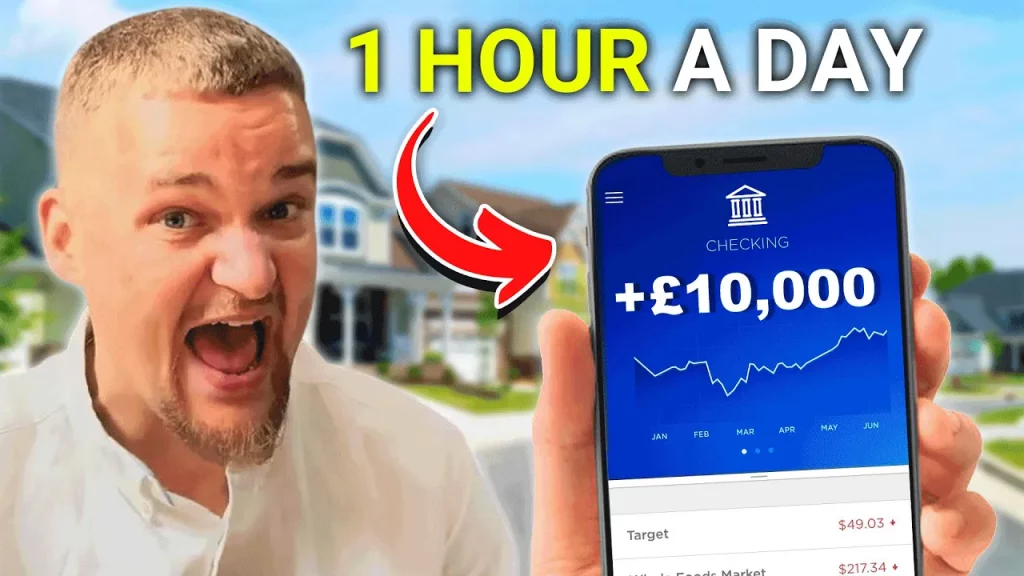Samuel Leeds Academy student Ian Thomas has made the transition from being a self-employed plumber to earning money on the side through property. In just eight months, he has become financially free through a portfolio of rent-to-serviced accommodation properties in Cardiff and Bath. Ian has also sold deals and his wife has now given up her job to join him in the business
‘You learn so much on the £1 crash course’
Ian works 60 hours a week on his plumbing and heating business. It leaves him with little time to spend with his wife and two young children.
As he explains: “If I’m not in work, I’m not earning money. I am the business.”
Property gives him a passive income which in the next few years he hopes to build on to free up more of his time and create generational wealth.
Like countless other students, it began for him at the £1 crash course when Samuel Leeds condenses the A-Z of property investing into a one-day seminar.
“It’s a great environment to be in. You learn so much in that one day that’s enough to get the ball rolling,” says Ian.
Afterwards he enrolled on some advanced training and then signed up for the year-long academy programme.
His mother, though, had concerns. “She said to me before I came for the second lot of training don’t go spending more money. She was convinced it was a scam.”
Ian pressed ahead despite the warning. “I knew I was going to join up to the academy because once I’m in something that’s it, I’m in full on.”
Before signing up he spoke to his wife who backed him. “She said if you think you can do it just go for it. That was all I needed. I joined the academy and haven’t looked back.”
It took him about a month to sell his first property deal. During that time, the rookie entrepreneur was constantly making calls and being rebuffed by landlords.
Rather than seeing it negatively, he turned it into a game after another academy member told him he had received 300 ‘no’s.’
“I thought that’s my target. I’m going to get 300 no’s and see where we go from there.”
He recorded each rejection on a chart in the back of his diary. Then, after 190 refusals he got seven yeses in one go having negotiatied a deal to buy seven apartments. Ian put down deposits to secure them and then had to find an investor to buy the flats.
As it was essential to find a buyer quickly, he passed on the deal to other sourcers who sold it.
“It was time-sensitive, so I thought just co-source with people who’ve done it before me and learn along the way,” he recalls.
Ian originally intended to take on two of the flats himself, but there were delays and he ended up handing those back.
It was only because of an accident that the plumber had time to go in search of deals he could sell to investors. He fell off his motorbike, fracturing one of his vertebrae which forced him to take a fortnight off work.
With an apprentice doing jobs for him, Ian was able to concentrate on making calls every day until alighting on the apartments and splitting his finder’s fee with the co-sourcers.
“I made just over £4,000 on those deals and then I took on a property in Cardiff as serviced accommodation from a deal sourcer.”
The following week he took control of another apartment in Bath, renting it from the owner and then letting it out at a profit. His portfolio now consists of two one-bedroom apartments – one in Cardiff and the other in Bath – and a three-bedroom flat in Cardiff. He has also just taken on a two-bedroom house, again in the Welsh capital.
Within a week of taking on the three-bedroom poperty it was booked up for two and a half months, giving him passive revenue until the new year.
‘I’m earning a full-time salary just off one deal’
If Ian had gone by his market research, he would never have invested in Cardiff. The occupancy rates for serviced accommodation appeared to be low. When he checked online bookings calendars to gauge the demand, they looked empty.
Seeing no reason why his business model wouldn’t work, he went ahead anyway. With a theatre, stadiums and plenty of construction work going on, Ian was confident of filling his rooms.
“When you get a gut feeling you know it’s going to work you’ve just got to take that plunge sometimes. But I’m still trying to figure out why it looks so bad when you do your due diligence.”
His initial aim was to achieve an occupancy rate of at least 50 per cent to break even, but soon there were customers clamouring to stay in his properties.
“It went from being 50 per cent to Bath having 100 per cent occupancy in the second month it was live when we had a one-month booking – and Cardiff has been long stay after long stay. I’ve had loads of requests.
“The one-bed in Cardiff I could have filled about four times. At that point you think I need another property. So, I thought I’m going bigger to see if the three-bed works.
“On the bigger properties, obviously, you make more profit. I’m making about £1,800 a month net profit on that one because it’s got a long stay. That’s a full-time salary just off one deal.”
He paid a sourcing fee of £3,000 for the property, plus a deposit of £1,600, and agreed to pay the landlord a rent of £1,500 a month.
Most of his guests are contractors and professionals. Five Amazon workers are staying in his largest apartment while providing cover over the busy Christmas period.
Both of his Cardiff rentals are conveniently located. It takes about half an hour to walk into the centre from the one-bedroom flat, which has on-street parking outside, while the three-bed is ten minutes away on foot.
His business model offers many benefits for landlords compared to a standard letting arrangement, Ian points out. If tenants damage the property or fail to pay the rent, it can take a lengthy court battle to remove them – whereas he can be shown the door straight away.
“As a company we’ll lease the property normally for three to five years and pay them guaranteed rent. If I don’t pay rent, they can just kick me straight out of the property because I’m a commercial tenant and they get the property back in the same condition or better.”
He gives an example where a shower broke in one of his apartments in Cardiff. Being a plumber, he bought a new one and fitted it.
“That hasn’t cost the landlord a penny. If that was a standard tenant, it might have cost £250. They’re having no unforeseen bills to pay because I’m maintaining the properties.
“At the end of the day that’s my business and if my property is not in A1 condition, no guests are going to stay there.”
Ian says it can be hard to persuade a landlord to hand over their property to a business like his because they are unfamiliar with the rent-to-rent concept. His training has equipped him with the knowledge and the skills to guide the owner through how it works.
He also ensures there is a break clause in place in case the property turns out not to be profitable. This allows him to get out of his contract after an agreed period.
Academy opens doors for Ian
Other academy members gave Ian a lot of tips when he was starting out. He still speaks frequently to the Property Twins, Gavin and Mitch Vaughan, who trained with Samuel Leeds Education. Another recruit, Teshi Cheema, who turned over £45,000 in one month from sourcing deals, has also given him advice.
In turn, Ian has passed on his know-how to new students, inspired by his property guru Samuel who has created a community where everyone is encouraged to collaborate.
When Ian took on his three-bedroom apartment, there were two others available in the same block. He worked with a deal sourcer who sold them to two investors on the academy.
The plumber turned entrepreneur is also helping another member who is in the throes of completing a buy, refurbish, refinance project in Bridgend.
“I’m doing the plumbing and heating in it. It’s just opened up doors that wouldn’t have been possible without joining the academy.”
He adds: “My wife, who has been helping me furnish the properties, is excited to get involved and I’m excited for her to be a part of it as well. We can go on the journey together now.
“Where I’m from in the Rhondda properties are really cheap. It’s a great area for BRRs. There’s a university about 20 minutes away, so I may jump into BRR to HMO. Local to me they’ve upgraded all the train lines, and every 10 minutes there are going to be trains going straight into Cardiff.”
His next target is to achieve an income of £10,000 a month from rent-to-SAs. “Then I’m going to look to buy properties and replacie the rent-to-SAs as they come to the end of the contracts with my own assets to create that £10,000 cash flow.”
‘I’ve seen how property gives you stability’
Part of Ian’s reason for becoming involved in property is his mother. She and his father built their own house at a cost of £55,000 when they were in their twenties. Now it is worth just under £400,000, emphasising to Ian how real estate provides security.
That was reinforced even more when his dad was diagnosed with a brain tumour. Before he passed away, he told his wife that she always had the house to fall back on. It was a big property and so for ten years she fostered children there, giving them a ‘better life.’
Ian says now his mother is on her own she is looking to downsize, using the equity in her home to purchase another house.
“I’m hoping that I can help my mother to invest the rest of the money to create financial freedom for her as well. I’ve seen with my own eyes what property can give you in the form of stability.”
Ian says he doesn’t want to quit his plumbing business while earning well from it but recognises the time may come when his other venture becomes his full-time occupation.
He sometimes works late into the night on his main job, preparing quotes, sending invoices out and speaking to customers. By contrast he spends about an hour a day managing his rental accommodation through his company, Charbell Properties.
“Property is more passive. I went on holiday for two weeks with the family. While I was there £3,200 was transferred into my account and I received £2,800 in bookings.
“I have to pinch myself sometimes when I sit down and look at the figures.”
Ian’s tips
- If you’re thinking about getting into property, get some mentors.
- You’ve got to put in the work. If you’re not willing to have that work ethic, you’re going to fail.
- Network is everything. If you don’t know something, you can go on the academy group chat and type any question you want about property. Somebody will know the answer.
Samuel Leeds’ verdict
“Ian has done so well. He is earning more money than most landlords make who own property and he has an excellent long-term business plan. He should be proud of what he has achieved.”






